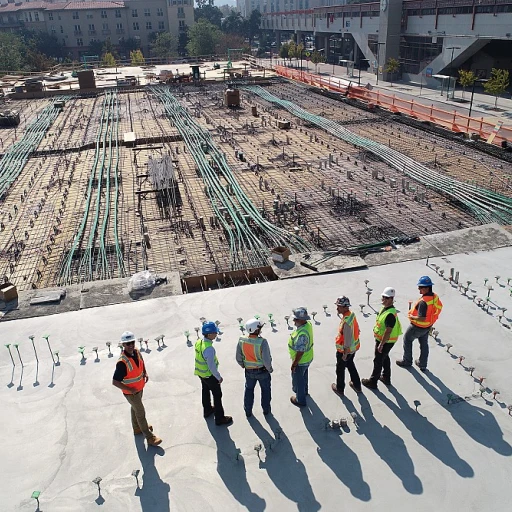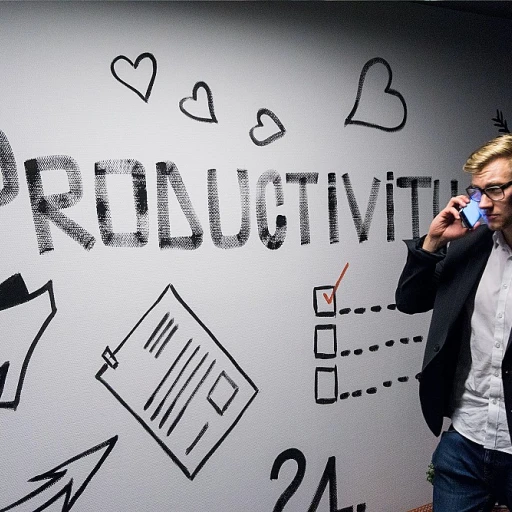
Understanding the Employee Experience Manager Role
The Strategic Importance of the Role
The position of an Employee Experience Manager has become vital in today's evolving workplace environments. As organizations increasingly recognize the importance of enhancing employee engagement and development, this role is at the forefront of creating a thriving company culture.
Crafting a Memorable Employee Journey
An Employee Experience Manager focuses on optimizing every stage of the employee journey, from the onboarding process to ongoing engagement, and even as they transition to new roles. This requires a keen understanding of how employees feel at each phase, enabling managers to tailor strategies that improve the overall work environment.
Key Responsibilities and Day-to-Day Tasks
The job description of an Employee Experience Manager is diverse and dynamic, often involving elements of both human resources and management. Responsibilities may include collecting employee feedback to inform strategies, developing initiatives that enhance employee experience, and collaborating with teams to foster a supportive workplace culture. Experience managers also work closely with leadership to align organizational goals with employee needs, ensuring that the company culture aligns with strategic objectives.
Impact on Organizational Culture and Success
By prioritizing employee experience, companies can see significant improvements in employee engagement, retention, and performance. This role is essential in realizing the potential of a motivated workforce, contributing substantially to organizational success. As a part of future work trends, organizations are increasingly investing in employee experience management to build resilient and agile teams.
Key Innovations in Employee Experience Management
Innovative Approaches Shaping Employee Experience Management
Employee experience managers today are at the forefront of driving innovative programs that enhance the work environment and boost employee engagement. These professionals are tasked with fostering a positive workplace culture that supports both personal and professional development for every employee. To effectively manage this evolving role, many organizations are implementing cutting-edge strategies that focus on the entire employee journey. Here are some key innovations currently shaping the field:- Data-Driven Employee Feedback Systems: Leveraging advanced analytics, companies are creating feedback mechanisms that help experience managers understand employee sentiment and identify areas of improvement. These insights are crucial for tailoring engagement strategies and addressing issues before they escalate.
- Customizable Onboarding Processes: Innovative onboarding frameworks are being devised to align with individual employee needs. Through personalized programs, new hires can quickly assimilate into the company culture and gain the necessary skills to thrive in their roles.
- Engagement-Boosting Technologies: The integration of digital platforms into the workplace experience is enhancing connections and improving communication across teams. Virtual reality (VR) and augmented reality (AR) are beginning to make their mark by offering immersive training and team-building activities.
- Future-Work Environments: Forward-thinking companies are redefining traditional workspaces. Flexible work arrangements and remote work technologies are being employed to create environments that promote productivity and satisfaction.
- Organizational Culture Workshops: Regular workshops focused on reinforcing the core company culture are increasing in popularity. Such initiatives not only foster a cohesive work environment but also equip managers with the tools necessary to lead effectively.
Challenges Faced by Employee Experience Managers
Addressing Current Obstacles in Employee Experience Management
Navigating the intricacies of employee experience management presents specific challenges that must be confronted by experience managers as they strive to enhance workplace dynamics. One key difficulty lies in aligning the company's overarching mission with the individual aspirations of employees. Striking this balance is pivotal in cultivating a thriving work culture that promotes engagement and satisfaction. Experience managers often grapple with transforming the onboarding process into a seamless and welcoming journey for new hires. Ensuring a positive start is crucial to foster long-term employee engagement, yet creating a personalized experience that meets diverse needs can be demanding. Moreover, obtaining authentic employee feedback is a perennial challenge. Encouraging employees to share honest perspectives about their workplace experience without fear of repercussions requires creating a culture of open communication and trust. It is imperative for experience managers to continuously gather and leverage feedback to refine management strategies and improve employee development. Adapting to the evolving demands of the future work environment also poses significant hurdles. Staying resilient amid ongoing changes, such as remote job roles and hybrid management, requires an agile approach. Continuous adaptation will prove essential for ensuring the best practices that keep teams motivated and connected. Effective employee experience management demands an understanding of these challenges and the implementation of solutions that benefit both the company and its people. For more insights on enhancing HR communication to address these challenges, visit Enhancing HR Communication for Modern Workplaces.Impact of Employee Experience on Organizational Success
Transformational Impact of Employee Experience on Business Outcomes
Understanding the importance of employee experience in today’s work environment is critical for any organization aiming for success. It's more than just buzzwords; it encapsulates what employees feel at every touchpoint within their job journey, from the moment they start the onboarding process, to their ongoing engagement, and finally, their development.
When companies prioritize a strong employee experience, it translates to various organizational benefits:
- Increased Employee Engagement: Fostering an environment where employees feel valued and motivated results in higher engagement levels. Engaged employees are more committed, productive, and likely to contribute positively to the company culture.
- Higher Retention Rates: An organization with a well-thought-out employee journey will often see lower turnover. Employees are more likely to stay with a company that invests in their personal and professional growth, and engagement initiatives.
- Enhanced Productivity: When workers feel satisfied and involved, it enhances their overall performance and boosts productivity. A good workplace experience driven by capable experience managers helps employees to work at their best.
- Development of a Positive Company Culture: A robust management of employee experience directly influences the shaping of a harmonious workplace culture. This, in turn, encourages a supportive and collaborative environment.
- Organizational Reputation: Positive employee experiences improve job satisfaction, leading to favorable word-of-mouth and a better public image for the organization. This is crucial for attracting top talent and retaining existing star performers.
Moreover, aligning the philosophy of employee experience management with broader organizational objectives ensures that every manager, from an experience director to a team leader, focus on achieving the organization’s vision. This alignment leads to strategic advantages and provides a competitive edge in the industry.
Case Studies: Successful Employee Experience Strategies
Learning From Successful Companies: Best Practices in Employee Experience Management
Strategic approaches in employee experience management have given many organizations a significant competitive edge. Through effective management, companies have fostered workplaces where employees feel valued and engaged, resulting in increased productivity and innovation. One notable example is a renowned tech company that revamped its onboarding process. By incorporating feedback loops, they tailored training programs that resonated with new hires, enhancing the overall employee journey from day one. This focus on personalized onboarding was pivotal in boosting job satisfaction and early employee engagement. Another instance comes from a well-known retail organization. They focused on creating a vibrant company culture where open communication and staff development were priorities. Regular interactions with experience managers provided employees with platforms for feedback, leading to continuous improvements in the work environment. In the manufacturing sector, an organization implemented a unique mentorship program led by their employee experience director. By fostering team-oriented initiatives, employees were encouraged to take ownership of their roles, contributing to a dynamic workplace culture that spurred innovation across various departments. Across these examples, a common theme is the proactive involvement of management. Experience managers play a crucial role in understanding the specific needs of employees and aligning them with organizational goals. This alignment not only supports employee satisfaction but also contributes significantly to the organization’s success. Organizations that have mastered the art of employee experience management demonstrate that when employees are engaged and their experiences are prioritized, it leads to not only individual growth but also the collective achievement of the company's objectives. As future work trends continue to evolve, companies that invest in fostering robust employee experiences are likely to maintain their competitive advantage in an ever-changing market landscape.Future Trends in Employee Experience Management
Embracing Technology for Enhanced Employee Engagement
As organizations strive to improve employee engagement, the integration of advanced technologies is becoming increasingly vital. Tools such as AI-driven analytics and virtual reality are transforming the way companies approach employee experience management. These technologies allow managers to gather real-time feedback and insights, enabling them to tailor the workplace experience to meet the evolving needs of their teams.
Personalized Employee Journeys
The future of employee experience management lies in personalization. Companies are beginning to recognize the importance of customizing the employee journey to enhance job satisfaction and retention. By leveraging data analytics, managers can create personalized onboarding processes and development plans that align with individual employee goals and aspirations, fostering a more engaged and motivated workforce.
Fostering a Culture of Continuous Feedback
Continuous feedback is becoming a cornerstone of modern workplace culture. Organizations are moving away from traditional annual reviews to more dynamic, ongoing feedback mechanisms. This shift not only helps employees feel more valued and heard but also empowers managers to address issues promptly, improving overall workplace dynamics.
Remote Work and Flexible Work Environments
The rise of remote work has reshaped the traditional work environment, prompting companies to rethink their employee experience strategies. Flexible work arrangements are now a key component of job descriptions, allowing employees to balance work and personal life more effectively. This trend is expected to continue, with organizations investing in tools and practices that support remote and hybrid work models.
Focus on Well-being and Mental Health
Employee well-being is gaining prominence as a critical aspect of experience management. Companies are increasingly prioritizing mental health initiatives and wellness programs to support their employees. By fostering a supportive work environment, organizations can enhance employee engagement and productivity, contributing to overall organizational success.













